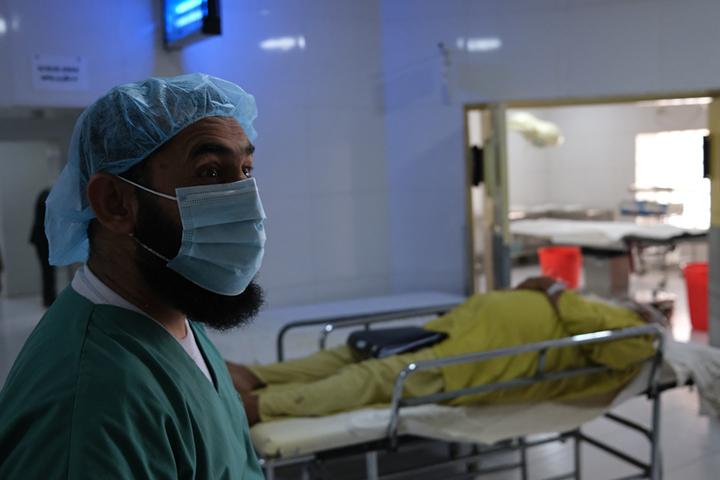Power seizure by the Taliban Afghanistan's rapidly changing medical scene now | Activity News | Doctors Without Borders
Afghanistan has undergone a rapid change of power after heavy fighting since May of this year. The fragile country is now facing mass evacuations, evacuations and disruptions to basic services, including health care. What happened in the medical field during the week from August 15, when the armed Taliban took over almost the entire country? Two medical staff from Médecins Sans Frontières (MSF) described the changing situation.
Hospitals overflowing with patients/Lashkarga, Helmand Province
Although the situation in Lashkarga, the capital of the southern Helmand Province, has calmed down, there is anxiety and uncertainty about the future. People who had been confined to their homes during the fighting have returned to the MSF-supported Boost State Hospital. In recent days, the emergency room has been overwhelmed with combat and traffic injuries, as well as respiratory and gastrointestinal patients. During the week of August 15-21, there were more than 3,600 emergency cases and 415 hospitalizations. An MSF doctor describes the tense situation in the hospital.
"Boost hospital received many battle wounded. The staff had little rest, and when patients arrived they would jump up and run to the emergency room. We were sleeping in the hospital. because it was very dangerous outside.
Since fighting ceased on August 13th, the thunderous sounds of airstrikes, rockets and mortars have disappeared. Road traffic has reopened in the city and surrounding areas, and people are coming to hospitals again. The number of patients is soaring. Usually, the number of patients is about 500 per day, but in the past week, we have dealt with more than 700 to 800 emergency patients per day. Some patients are brought in in critical condition as they wait for the fighting to end. Part of the reason why the hospital draws so many patients is because the local clinics are not able to meet the needs of the people. We refer about 200 non-severe patients to other clinics every day, but many of them come back saying, 'We didn't have the medicine we needed' or 'It was closed due to lack of manpower.' . Traffic has resumed, and many people come to the hospital from the suburbs.The hospital is already full and cannot accept any more patients. More than 300 people are in the hospital right now, more than there are beds. As the number of emergency patients increases, securing space in the hospital becomes a problem, and patients have to wait for a long time. In the pediatrics ward, sometimes two children sleep in one bed, but that's not enough. Therefore, we decided to evaluate whether hospitalization is required depending on the severity.
About 80 to 100 patients a day are severely ill patients requiring hospitalization. To make room for that bed, other patients who are not seriously ill must be discharged or the length of stay must be shortened. This is a big challenge and no long-term solution is in sight.”Supporting pregnant women with anxiety / Horst, Khost
In the southeastern province of Khost, MSF operates a maternity hospital in the city of Khost. and supports eight general public health centers in rural areas. Between 15 and 22 August, the MSF maternity hospital received 402 pregnant women and assisted 338 births. A doctor who works at this hospital told the current situation.
“Things are tough in Horst, even if they haven't had the heavy fighting that has happened elsewhere. Markets, transport, and many clinics have been closed, making access to medical care very difficult. Also, giving birth at a private clinic costs 3,000 to 5,000 afghanis (approximately 4,119 to 6,865 yen), adding to the burden on household budgets.
Many pregnant women visit the maternity hospital because MSF provides free medical care. Pregnant women are especially vulnerable. Our hospital has traditionally focused on pregnant women with complications. However, now that local residents have difficulty accessing medical care, we have expanded the hospitalization criteria and are providing medical care to all pregnant women. We have heard from local organizations that we work with that it is difficult for residents in remote areas to receive medical care. Transport systems have not been fully restored, and there is concern that the supply chain for life-saving medicines will be disrupted. Despite the challenges, MSF is committed to continuing its medical work and meeting the medical needs of mothers and children in war-affected areas.”

![10th generation Core i5 equipped 9.5h drive mobile notebook is on sale at 50,000 yen level [Cool by Evo Book] 10th generation Core i5 equipped 9.5h drive mobile notebook is on sale at 50,000 yen level [Cool by Evo Book]](https://website-google-hk.oss-cn-hongkong.aliyuncs.com/drawing/article_results_9/2022/3/9/4a18d0792cae58836b71b9f591325261_0.jpeg)





![[Amazon time sale in progress! ] 64GB microSD card of 1,266 yen and wireless earphone with noise canceling function of 52% off, etc. [Amazon time sale in progress! ] 64GB microSD card of 1,266 yen and wireless earphone with noise canceling function of 52% off, etc.](https://website-google-hk.oss-cn-hongkong.aliyuncs.com/drawing/article_results_9/2022/3/9/c88341f90bab7fe3ce1dc78d8bd6b02d_0.jpeg)
